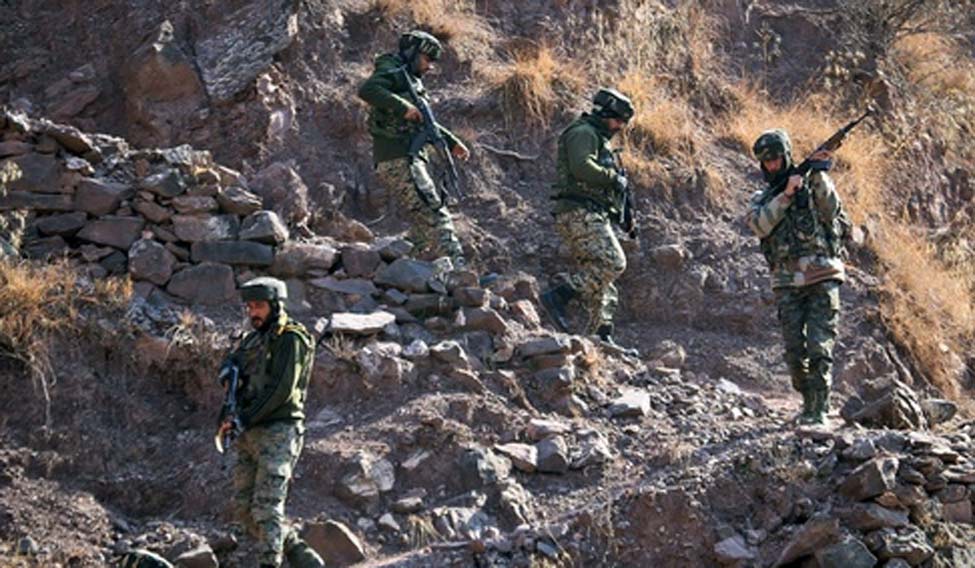On January 15, an official of the defence committee of Pakistan's Parliament said that a proposal for a meeting of the director generals of military operations (DGMO) of India and Pakistan was being considered to lower tension on the Line of Control (LoC).
The last such meeting was held four years ago at Wagah but that did little to improve the situation on the border.
Though the DGMOs of the two countries are connected by a hotline, the proposal for a meeting is reflective of Pakistan's growing anxiety due to the aggressive posture adopted by India on the LoC and IB.
Some in Pakistan believe the meeting of DGMOs will convey an impression that Pakistan was buckling under the Indian offensive.
What has rattled the Pakistan Army is India's liberal use of heavy-calibre weapons like missiles, mortars, artillery and deadly air bursts that have caused huge loss to the lives, of soldiers and civilians, and property on the Pakistani side of the LoC.
The defence committee was informed that Pakistan would like to discuss the scaling down of the use of heavy-calibre weapons on the LoC, which has resulted in the killing of 87 people, both civilians and soldiers, on the Pakistan side in 2017.
India, defence sources indicate, is unlikely to heed to a request to scale down the use of heavy-calibre weapons unless Pakistan agrees to stop sending militants into Kashmir.
Unlike in the past, the Pakistanis are finding it hard to match India 'blow for blow' because of the precarious security situation in its tribal areas, which the Pakistani Parliament recently decided to merge with Khyber Pakhtunkhwa, bordering Afghanistan where the Taliban are regularly targeting Pakistani security forces from Afghanistan through suicide bombings and ambushes.
The Taliban suicide bombers are also attacking Pakistani forces in Baluchistan where China is working on the China-Pakistan Economic Corridor (CPEC), which is estimated to be worth $62 billion.
The Daesh (ISIS) militants are also staging attacks against the Pakistani forces in the tribal areas, Baluchistan, Khyber Pakhtunkhwa and Sindh.
Though the Pakistan Army has driven out the Taliban from most of the tribal swathes, it has cost the country dearly in terms of money and manpower.
Close of 2 lakh Pakistani soldiers are deployed on the treacherous Pak-Afghan border and in Baluchistan. Some of them are also protecting the CPEC.
The security and economic crisis for Pakistan have worsened due to the US' decision to cut military and security assistance to Pakistan.
The US has piled pressure on Pakistan to curtail the activities of Afghan Taliban, especially, the Haqanni Network.
The 2003 ceasefire that Pakistan announced had resulted in the US prevailing upon India to maintain calm on the LoC and IB. Pakistan reciprocated by curbing infiltration, which helped India target the remaining militants in Kashmir.
This time around, India's aggressive posturing on the LoC has the tacit support of the US to force Pakistan to act against the Afghan Taliban.
The double squeeze on both the western border with Afghanistan and eastern border with India has caused great consternation to Pakistan.
Unlike in the past, India has been responding to Pakistani ceasefire violations to give cover to infiltrators with massive firepower.
On January 16, when the Indian Army was celebrating Army Day, seven Pakistani Army men were killed in an Indian action in Poonch. Pakistan admitted to the killing of ''four soldiers when they were repairing the communication lines.''
The Indian attack was in response to the January 13 killing of Lance Naik Yogesh Muralidhar Bhadane in Sunderbani sector of Rajouri by Pakistani snipers.
Bhadane was killed when an army patrol was on its way to relieve soldiers at the post in Sunderbani.
Three Pakistani soldiers were killed on December 26 in a retaliatory action by India two days after four Indian soldiers, including a major, were killed by Pakistan in Rajouri sector of Jammu.
The Pakistanis are finding it difficult to deal with the policy of 'escalatory' responses by India through use of heavy-calibre weapons.
Pakistan wants to restrict the clashes to low-calibre weapons to minimise damage to life and property while pushing infiltrators into Kashmir. But the upping of the ante by India has left Islamabad rattled. More so, the civilians on the Pakistani side have borne the brunt of the clashes.
What is working to India's advantage is its numerical strength of 2.25 lakh troops to Pakistan's 1.25 lakh men, superior weapons, and advantageous terrain.
All these factors are helping the Indian Army make the life of the Pakistani Army difficult on the LoC and IB.
By all indications, 2018 could be a hot year on the LoC as Army Chief Bipin Rawat has warned that the Indian Army would step up its offensive approach on the LoC to maintain a dominant posture.






